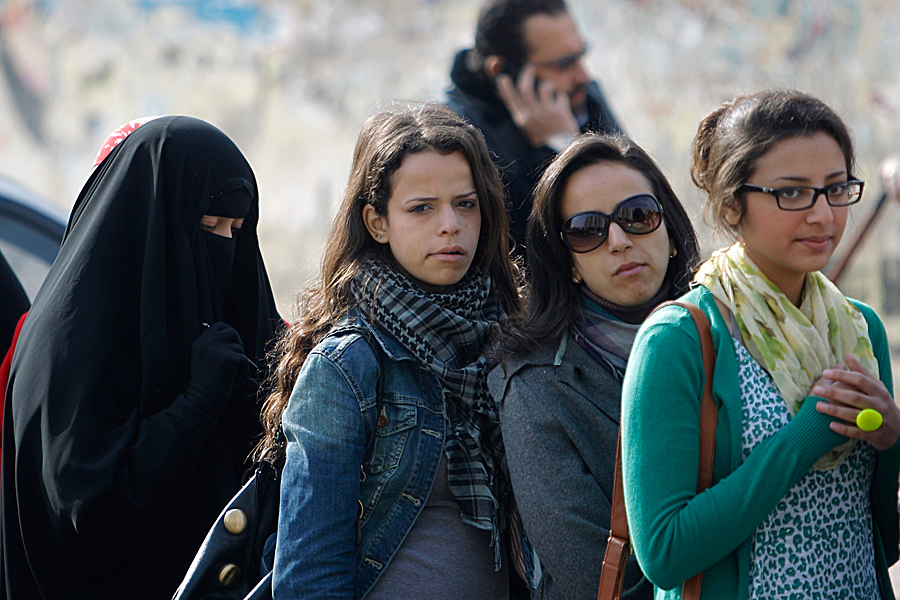By Anya Vanecek, Aswat Masriya
At the top of Ahmed Orabi Street, seven Americans smiled impishly at the Cairo Jazz Club bouncer. Not one was carrying an ID – or over the minimum age of 25; he didn’t seem to mind. From the centre of the pack, I twirled the hanging ends of my Spanish-styled headscarf. He did mind that. Pointing directly at my covered head, the bouncer demanded I show my ID. Adopting a pointed American accent, I replied, “I don’t carry it with me.” The bouncer scolded me, but allowed me to follow my friends into the club. “Bring it with you next time,” he warned.
Cairo Jazz Club is one of many high-end, alcohol-serving establishments which have come under fire in recent years for turning veiled women away – allegedly for morality’s sake. An article published four years ago by Ashraf Khalil for the Egypt Independent reported that “several club owners and patrons, when asked about the issue [of these unofficial hijab-free zones], questioned why someone who is truly devout would want to be in a nightclub or bar in the first place.”
The assumption made when turning these women away is that a headscarf is a symbol of morality, and that such supposed morals clash with the nature of the establishment. The woman isn’t allowed because she simply doesn’t belong there; a priestess in a gentlemen’s club.
At a press conference held in the United Arab Emirates at the beginning of May 2013, tourism minister Hisham Zaazou said “bikinis are welcome in Egypt and booze is still being served.” In other words, foreigners – and their morals – are more than welcome. It is Egyptians whose morals need monitoring; the rest are free to enter, assuming they look the part.
“For decades, more and more Egyptian women have decided to don the veil,” stated a 2012 article in The Globe and Mail. Some ascribe this to a rise in Islamism. “Many [of those women], however, see no contradiction between their dress and pushing for broader women’s rights in post-Mubarak Egypt.”
Indeed, women deserve to act how they please. Whether more and more Egyptian women are wearing hijab as a religious statement or a fashion trend is immaterial, except that Cairo’s elite establishments have recognized this trend and decided to take advantage of it. By prohibiting head-scarves, they are simultaneously prohibiting a vast majority of Egyptian women and subtly forming the shape of their clientele. The goal is exclusivity.
Unfortunately, by imposing this exclusivity, these clubs are also propagating women’s struggle for autonomy. To enter Cairo Jazz Club, for instance, a woman must choose between her “morality” and her freedom to go where she pleases. Simultaneously, she must choose her identity and play the part. She’ll either be good or naughty, Egyptian or other. Either she will look like she fits in or she won’t.
These clubs could not care less about the morality of their patrons. Their concern is their image and what or who is tainting it. Tough luck to the woman whose look does not fit their mould.
“I’m sure there’s an element of class warfare,” said one socialite in a Kipp Report article. “It’s a remnant of the old days when the hijab was considered low class.” More progressive, Westernised Egyptians reject the hijab for social, not religious, reasons. Overt religiosity is out of fashion. By dropping the hijab, Egyptian women are able to blend into the ambiguous, elite “other” whose prestige arises from simply not conforming to the expectations of its culture. This ambiguity could be liberating, if it wasn’t so restrictive.
Rarely is a woman in public granted the freedom to exist without judgement. She is forever adorned with and accused of acting as a symbol of something: her skirt is either modestly long or shamefully short, her expression either hostile or flirtatious. Despite the intention behind a woman’s outward appearance, society is constantly confining women in shallow judgements, allowing her to exist only in certain ways and areas of her world. Often, these are imposed not only on the woman herself, but on the group she seems to represent. A woman’s integrity might be as much determined by her peers as by herself. A woman cannot choose which group an onlooker may clump her into, how one interprets her dress or stance, what she represents to them, or how they react to her. She cannot choose where she belongs.
Ultimately, it should not matter what a woman wears. Her piety is not sewn into her hijab, nor is her worth. No aspect of her external person defines her character. Fashion trends always carry some message, it’s true, but trends are far more fickle than human characters, and so are their connotations. To limit a person’s access because of their appearance is both ineffectual and short-sighted.
The truth is, I am not a Muslim woman and I did have a drink that night I wore a scarf to Cairo Jazz Club. Neither of those truths had any influence on what was ultimately an aesthetic decision. Covering my head makes me feel a little more enigmatic, a little safer. Mostly, I just like how I look in a scarf. Take it off and I am the same woman with the same morals. The same is true of any woman who does or does not wear a scarf, because a woman is never defined by her appearance. The significance of our look – or our moralities – no bouncer has the right to decide.
This article was provided to Egyptian Streets by Aswat Masriya. Check out their website: http://en.aswatmasriya.com/. This article was originally published in 2013.




Comments (20)
Reblogged this on Oyia Brown.
I read an article once in a Canadian newspaper explaining how Copts are discriminated against because they aren’t allowed to study at Al Azhar University. I questioned the article because its tone was erroneous. Which Copt would want to study at Al Azhar University, a university that obviously focuses on Islamic studies?
I think the same would apply here. Which veiled woman would want to go to a bar? I thought the hadeeth says, “Curse upon those who drink, serve, and be present in a drinking environment.” Assuming that a veiled woman is pious, why would she want to be present in such an environment?
I’m totally for woman’s rights; however, I’d choose a better route to prove it though.
Why would a “veiled woman want to go to a bar?”
For the same reason a man would. Social interaction. Looking for love. Meeting a client. Curiosity. Like the music. Whatever. The possession of a penis doesn’t exempt men from the same rules and mores they like to impose on women. I don’t notice that bouncers are checking male ID’s or asking about piety in the male clientele.
But don’t you see, neither would a pious man. A bar is off limits for the religious man and woman, so you would be choosing the wrong venue to prove your womanhood.
I am not veiled, but I, too, would find it totally peculiar if I saw a veiled woman in a bar.
But you’re using your definition of a ‘veiled woman’ to put it on everyone with a veil. As this article shows, you can be wrong about the motives, or be wrong about their intentions all together. I think the hijaab nowadays can also very much be a fashion statement.
My point is that only Allah should be determining the morality or the piety of the individual, not men. And men don’t question the morality or piety of men that go to these bars, only women’s. It’s a double standard and almost seems to make women less than fully human – as if they can’t choose for themselves and have to be constantly monitored, like a child or a pet rather than a woman.
I disagree with you. He’s only Allah is to punish her if she sins. If the club owners are devouted to protect Islamic values then why did they allow bars from the first place? Of course they have other discriminative reasons to not allow her to enter. She might want to enter with her unveiled friends? Why should she be separated fromthem? And any person regardless their religion has the right to study in Azhar. He might be a Christian who’ interested in the Islamic culture.
I agree with you, Samar. It’s not up to the club owners to punish, and I didn’t say that.
Still, I don’t know if a Copt can’t attend Azhar University. I know of a Copt who holds a Ph.D. in Islamic studies. The question is is it the norm? Does the Copt really want to study Islam? I would have suggested to the article writer a zillion other situations, more valid, in which Copts are discriminated against.
All what I am saying is that the author is proving her womanhood and rights in the wrong place. If a bearded man with a huge zebiba enters the bar, he would be looked at in the same fashion as the veiled woman. It is not the usual choice for either. I don’t think the bouncers are reacting to her as a woman as much as an overly pious person. The expectations from a veiled woman, or a bearded man with a zebiba for that matter, are pretty much the same.
‘It’s not the usual choice for either’ – Are we living in the same country?! The sight of an egyptian woman’s hair is so unusual for me that I can’t stop looking out the corner of my eye, usually with a big smile on my face. (But then again, I don’t live in Maadi.) So my point is that the bearded man is making a point of exhibiting his religiousity, and his piety is a fundamental part of his identity. At a guess I’d say that 98% of the women in Egypt wear hijab. So, even if some women are wearing it as an expression of their piety, for others it has more to do with social expectations than anything else.
I disagree, people should be allowed to do as they see fit regardless of their religion..
To add to that, people should think of the backlash if conservative muslims hear or see anything about a valid woman in a bar. That will only mean trouble for the night clubs and their owners. It makes sense for them not to allow valid woman, not for the sake of morality but simply because Egypt is too conservative and is only getting more conservative. Thats bad news for the nightclub owners who simply want to stay out of the spotlight.
With that said, most nightclubs want good looking people as their core customers as that makes them more popular among young people.